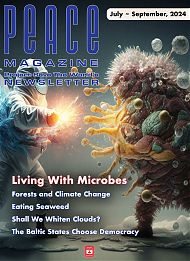Newsworthy
Forests and Climate Change
Can reforestation help mitigate climate change? Only if it’s done rapidly and sustainably. The opportunity is rapidly closing.
Eating Seaweed
There will be two billion additional people wanting food in 2050. Seaweed will provide many of them with a nutritious diet, and feed the fish too, which will become more plentiful because of it. Try algae today.
The Rise and Fall of Gazprom
Gazprom was so profitable that people said, “When Russia runs out of gas, Gazprom will be able to heat the entire country for another year just by burning its paper money.” No more. Konstantin Samoilov explains why.
Living with Microbes
People and animals produce 5 trillion kg of fecal waste each year. We’re doing a poor job of sanitation, Laura Kahn notes. Fecal waste worsens anti-microbial resistance, makes us sick, contaminates our atmosphere, and worsens climate change. Instead of looking for more ways of curing disease, we should concentrate on prevention.
Road Ahead on Autonomous Weapons
On battlefields, Branka Marijan says, AI decision- support systems are already diminishing human control over targeting. Humans have mere seconds to AI’s suggestions
A Townhall Discusses Student Encampments
Ruth Otim writes that the Gazans are uploading videos showing the devastation around them, so the world is seeing atrocities more than in previous wars.
The Baltic States: Defending Democracy
Latvia, Estonia, and Lithuania regard Russia’s attack on Ukraine as evidence that Putin would try to recover their lands too, if not prevented by NATO. Marcus Kolga shows us the mainstream view in all the Baltic countries
Shall We Whiten Clouds?
Our “Cool Thinking” forums consider refreezing the Arctic. A promising way is to spray saltwater into low clouds. This whitens them, so they reflect more sunshine back into space, cooling the ocean below. In this forum, three engineers discuss the plan.
Shall We Try Athenian Democracy?
Until about 200 years ago, “democracy” was understood to mean government by the people, not by elected representatives. Hugh Pope and Metta Spencer talked about how the Athenians made it work – and how citizens’ assemblies do so today.
Do You Understand Carbon Sequestration?
Are you up to speed on global warming proposals? Test yourself on sequestration methods. Then we have a free course for you on Udemy.

